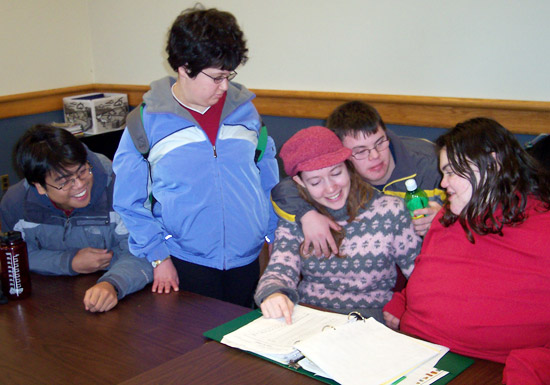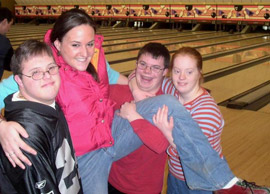Programs Provide Jobs, Friendships for Special-Needs Adults
 |
| From left to right, Cecil Apostol ’08, Kristina, Kimberly Greenberg , Bobby and Carolyn go over math problems at the Davenport Campus Center. Kristine, Bobby and Carolyn are students enrolled in the Middlesex Transition Academy, which meets at Wesleyan daily. Pictured below are Jesse, Jessica Markowitz ’08, Bobby and Lauren. |
| Posted 12/19/05 |
| The pizza served at McConaughy Dining Hall is prepared by a new member of the Wesleyan community. As part of a cooperative educational program for individuals with special needs, 19-year-old Kristina is learning hands-on how to work in food services.
I prep the dough, oil the pans, and flip it, Kristina says. I technically make the whole pizza. I havent thought a lot about it, but I might want to work in a restaurant or pizza place after this. I do like to work with people. Preparing Kristina and six other disabled adults aged 18-21 to function individually in the community is the goal of the Middlesex Transition Academy. Launched in March 2004, the academy helps disabled individuals who recently graduated from area high schools find employment. Wesleyan provides classroom space and job opportunities for the grant-funded program. Under direction of a job coach, the academy members learn about their strengths and weaknesses, managing money and social skills. While on campus, they also attend functional academic classes in the Davenport Campus Center. At Wesleyan, they are assigned various jobs at Davenport, Exley Science Center, McConaughy Dining Hall, Freeman Athletic Center and WesShop. Frank Kuan, director of Community Relations for the Center for Community Partnerships, says having the academy students on campus offers an excellent opportunity for them to be connected with Wesleyan students. The university also benefits by having this diverse group as part of the Wesleyan community. It is gratifying to see the growth of these students during their time on campus, Kuan says. You can see them developing their life skills and independence. This community connection is truly a win-win for all of us. While Lauren, 18, sorts and folds mail at the science center, Bobby, 18, is busy washing dishes at McConaughy or stocking shelves at WesShop. Both agree that working in a college environment is gratifying. Bobby enjoys the friends hes made. Lauren favors the college atmosphere and is overwhelmed by cute college boys. The job is pretty easy, and I just love working for money, says Bobby, who works five days a week. I love money! Normally, when a student is 18 and graduates from high school, he or she goes on to college or employment. Christine Jakubiec, an academy teacher, says the academy provides opportunities to address individual transition goals in an age-appropriate, college environment for these disabled adults in the 18-21 year range. As her pupils get closer to the age of 21, they are weaned off a job coach and should be ready to find similar jobs in local businesses.
Kimberly Greenberg 07 says her buddy, Rick, brightens her moods. She can always find him making pizzas at McConaughy during the lunch hours. In his second year with the organization, College Buddy Director Cecil Apostol ’08 has developed a meaningful relationship with his buddy Winston, 28. Apostol feels that society stigmatizes people like Winston. “They have been neglected and marginalized as much as any other minority group, Apostol says. We expose them to a world that was denied to them for so long. Together, we both embrace the opportunity to participate in a long-lasting, meaningful friendship.” Best Buddies is accepting associate members. For more information e-mail capostol@wesleyan.edu or kgreenberg@wesleyan.edu. The Transition Academy meets at the Campus Center from 8 a.m. to noon Monday, Wednesday and Friday and 11 a.m. to 1 p.m. Tuesday and Thursday. |
| By Olivia Drake, Wesleyan Connection editor |


 All seven students enrolled in the Middlesex Transition Academy also are part of Wesleyans student program called “Best Buddies.” Best Buddies matches Wesleyan students with adults from the Middlesex County area. Wesleyans Center for Community Partnerships began spearheading this collaboration last year. Best Buddies go bowling (pictured at left), star gazing and participate in other monthly activities.
All seven students enrolled in the Middlesex Transition Academy also are part of Wesleyans student program called “Best Buddies.” Best Buddies matches Wesleyan students with adults from the Middlesex County area. Wesleyans Center for Community Partnerships began spearheading this collaboration last year. Best Buddies go bowling (pictured at left), star gazing and participate in other monthly activities.